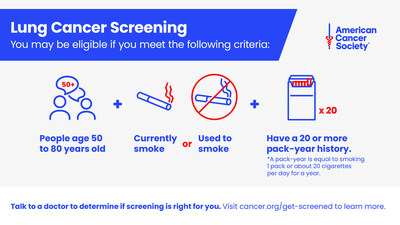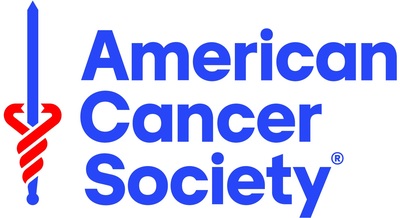November is Lung Cancer Awareness Month, and the American Cancer Society urges discussing lung cancer screening with a doctor
DES MOINES, Iowa, Nov. 1, 2024 /PRNewswire/ — Lung cancer is the second most common cancer in both men and women, aside from skin cancer, and stands as the overall leading cause of cancer death in the United States. According to the American Cancer Society (ACS), an estimated 2,600 Iowa residents will be diagnosed with lung cancer this year. Symptoms usually don’t appear until the disease is already at an advanced stage, making lung cancer screening critical to finding it early when it may be easier to treat.
While anyone can get lung cancer, the risk is higher for people who currently smoke or formerly smoked. The American Cancer Society’s lung cancer screening guideline recommends yearly lung cancer screening for people aged 50 to 80 years old who smoke or formerly smoked and have a 20 year or greater pack-year history. A pack-year is equal to smoking 1 pack per day for a year.
The recommended annual screening test for lung cancer is a low-dose computed tomography scan (also called a low-dose CT scan, or LDCT).
Ten years have passed since the U.S. Preventive Services Task Force (USPSTF) first recommended low-dose CT for lung cancer screening, yet lung cancer screening rates remain low. In Iowa, only 7 in 100 eligible individuals have undergone the screening (source). This is a striking contrast to more established screening tests for other cancers, including screening mammography (79%) and colorectal (73%) cancer screening.
Access to and utilization of lung cancer screening has been particularly challenging for people who live in rural areas. These individuals are more likely to live more than 30 minutes away from a designated lung cancer screening center, be underinsured, and have lower health literacy levels. Inadequate access to care and low utilization rates for lung cancer screening present an opportunity for patient and caregiver advocates, community health organizations, medical professionals, cancer centers, health systems, payers, and industry partners to work together to promote health equity, reduce healthcare disparities, and enhance accessibility to lifesaving and effective lung cancer screening.
“Iowa has had one of the slowest declines for both new lung cancer cases and lung cancer deaths, especially for females, in the US,” said Mary Charlton, director of the Iowa Cancer Registry, president of the Iowa Cancer Consortium, and volunteer and previous research grantee of the ACS. “Only 28 percent of lung cancer cases in Iowa are found early. Finding lung cancer as soon as possible can greatly increase chances of survival, so it’s important for doctors to talk with their eligible patients about the potential benefits and limits of yearly screening.”
ACS has partnered with the Iowa Cancer Consortium, Iowa’s statewide coalition of 700 cancer control partners, to form a Lung Cancer Screening Learning Collaborative Series (LCS^2). The goal of LCS^2 is to increase lung cancer screening rates in Iowa by helping key partners develop individualized action plans to increase lung cancer screening among their eligible patients.
To learn more or find a screening location near you, visit cancer.org/getscreened.
About the American Cancer Society
The American Cancer Society is a leading cancer-fighting organization with a vision to end cancer as we know it, for everyone. For more than 110 years, we have been improving the lives of people with cancer and their families as the only organization combating cancer through advocacy, research, and patient support. We are committed to ensuring everyone has an opportunity to prevent, detect, treat, and survive cancer. To learn more, visit cancer.org or call our 24/7 helpline at 1-800-227-2345. Connect with us on Facebook, X, and Instagram.
About the Iowa Cancer Consortium
The Iowa Cancer Consortium is Iowa’s statewide comprehensive cancer coalition. As a leader in cancer control, the Iowa Cancer Consortium offers the state’s key cancer partners access to resources, expertise, and non-competitive collaboration across traditional boundaries for a bigger impact in cancer prevention, early detection, treatment, quality of life, and health equity. The Iowa Cancer Consortium also maintains the Iowa Cancer Plan, a blueprint for Iowans to work together to reduce the burden of cancer. Learn more at www.canceriowa.org.
![]() View original content to download multimedia:https://www.prnewswire.com/news-releases/lung-cancer-screening-may-detect-cancer-before-symptoms-show-302293287.html
View original content to download multimedia:https://www.prnewswire.com/news-releases/lung-cancer-screening-may-detect-cancer-before-symptoms-show-302293287.html
SOURCE American Cancer Society

Featured Image: Megapixl @ Noipornpan












